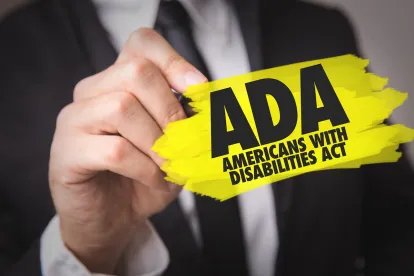The U.S. Court of Appeals for the Sixth Circuit recently confirmed the standard to establish a claim under the “regarded as” prong of discrimination under the Americans with Disabilities Act (ADA). Applying the correct standard for such claims, the Sixth Circuit reversed the district court’s decision granting summary judgment in favor of the defendant employer.
In Babb v. Maryville Anesthesiologists, P.C., the Sixth Circuit reversed the district court’s grant of summary judgment in favor of the defendant employer. The plaintiff, a certified registered nurse anesthetist (CRNA), had been diagnosed with a degenerative eye condition, but according to plaintiff, her condition did not affect her ability to perform her job responsibilities.
The plaintiff employee alleged that she was terminated due to an incorrect perception that her eye condition was a disability. On the other hand, the defendant employer argued that the employee was terminated for clinical errors, rather than her perceived disability.
After excluding the employee’s expert evidence regarding the standard of care for CRNAs, the district court granted summary judgment in favor of the employer. The court concluded that while the employer might have perceived the employee as disabled, there was nothing in the record to suggest that the perceived disability was the basis for the termination rather than the employee’s alleged clinical errors.
The Sixth Circuit reversed, finding that there were genuine factual disputes regarding whether the employer regarded the employee as disabled and whether the employer’s proffered reasons for the employee’s termination were pretext.
The Sixth Circuit also concluded that the district court had erred in excluding the plaintiff employee’s expert testimony. The expert had opined on the standard of care for CRNAs, and concluded that the employee’s performance had met that standard. The district court excluded that testimony in its entirety, characterizing it as an impermissible legal conclusion regarding pretext. The Sixth Circuit disagreed, finding that “district court used a sledgehammer, when the law required that it use only a scalpel.” According to the Sixth Circuit, the expert opinion on the standard of care shed light on the employer’s claim that the employee had actually committed “critical” errors and displayed “terrible clinical judgment.” The Sixth Circuit made clear that expert testimony is not inadmissible simply because it suggests an answer to an ultimate issue or provides an inferential basis to decide an ultimate issue; rather, expert testimony is objectionable only if it opines on the ultimate question of liability.
The appeals court thus considered the excluded expert evidence, along with the remainder of the record. Critically, the record included an email sent by a fellow CRNA hours after the plaintiff employee’s termination, stating that she had been terminated due to “major issues with her eyesight.” As the court explained, the email “essentially [stated] that [the defendant employer] was firing [the plaintiff employee] because of her impaired vision.” According to the Sixth Circuit, “[i]f this kind of ‘smoking gun’ evidence cannot get an employment discrimination plaintiff past summary judgment on the question of pretext, it is hard to imagine what could.”
Importantly, the Sixth Circuit’s Babb decision confirms the standard for claims alleging “regarded as” discrimination under the ADA. The First, Fifth, Tenth and D.C. circuits have all previously held that to make a “regarded as” claim under the ADA, an employee need only show that their employer believed they had a “physical or mental impairment,” whether or not the purported impairment qualifies as a disability under the ADA. They must also demonstrate that the perceived disability was the “but-for” cause of the adverse employment action. As the Sixth Circuit put it, under the ADA, “your employer can’t fire you because they think you are disabled, even if, in fact, you are not disabled.”
To be clear, the Babb decision presents an example of a relatively uncommon scenario: seemingly rock solid direct evidence of discrimination. It is (hopefully) rare that such blatant discrimination occurs, and certainly uncommon for direct evidence of it to exist.




 />i
/>i
